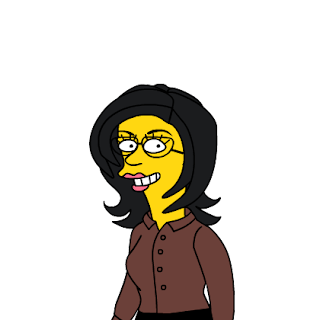Several days ago I was shocked into reading a book entitled, "Lies My Teachers Told Me: Everything Your High School History Textbook Got Wrong" by James Loewen. I have to admit, the title did snare me. After all, I am a Home School Mom and I just love it when text books, which are, in my opinion, the archrival to learning, are proven wrong. However, it wasn't just the title that lured me in, it was the first chapter. Right off the bat, Dr. Loewen smacked me with a sentence that just floored me.
"The truth is that Helen Keller was a radical socialist."
What? Helen Keller was a socialist? How incredibly anti-American! How ungodly! How scandalous! How interesting! An image of her sitting in a rocking chair, by a warm cozy fire, reading her braille edition of "The Communist Manifesto" popped into my mind -- an image I'd never thought could even exist, let alone be conjured in my mind. My world had been rocked, and now I was hooked. I had to read the rest of this book.
However, first I had to understand how, and if truly, Helen Keller was a socialist. It was something that wasn't hard to verify, as the woman was not only a member of the communist party in the U. S., but towards the end of her life wrote letters to a friend who was incarcerated for her communist activities. Apparently Keller was outspokenly socialist in her early adult years, but then moved her socialist activities to the back burner for her later years, as being an advocate for the blind was placed in the front. Wow. You learn something new everyday.
Dr. Loewen's reason for including Helen Keller's socialism interested me, because he has a good point. Most people think of Helen Keller as someone who miraculously overcame her incredibly difficult disabilities. Indeed, I have spoken to my children often about Helen Keller, because she is a great role model for not only my girls, but my boys (whose disabilities include an inability to carry multiple items at once, and problem solve such things as "Where did I put my shoes? How can you expect me to find them when I don't know where I put them?").
Yet, as Dr. Loewen points out, what did Helen Keller do after she overcame her disability and graduated from Radcliffe?
Good question. I realized that I had no idea. Here, for all these years, I've been touting Helen Keller to my children, and self, as a great person who overcame her disability and I had no idea what exactly she did once she overcame her disability. Well, according to Loewen, it's because after she overcame her disability, she became a socialist -- something text books don't really like about her, so they just happen to leave out the 60+ years of her life after overcoming her disability.
Why didn't this ever occur to me?
According to Loewen and several other sources I read (including her obituary) , Keller's socialism grew out of her righteous anger over the treatment of the working class in America when she learned that a large portion of the blindness in this nation came from work related accidents due to unsafe working conditions.
I would grant that now, especially after the fall of the Soviet Union, and seeing, first hand, the fruit of communism, we know that socialism is a baseless idea, chalk full of fallacies and doesn't even begin to factor in the effects of sinful human nature on a society. It seems ridiculous that anyone would believe that socialism would work, although there are professing Christians who believe as strongly in capitalism as Keller did socialism, and capitalism isn't exactly God's economy either. But, I digress.
What is interesting, though, is that no one does mention that Keller was a socialist. According to Loewen, and I have to agree, this is because textbooks, and other teaching aids I might add, want to create "heros". Someone over coming their disability is a hero. Someone doing that and then becoming a socialist is not a hero. However, in creating "heros" some of the truth gets left out, and a myth is created or there is some insight lost because of it. I don't like the creating of heros, because I only want there to be one hero in my life: Jesus.
Is Helen Keller any less amazing because of her political views? I would say no. After the shock wore off, Helen Keller became more human to me. She wasn't a genius, she wasn't an infallible saint. She was an amazing woman who lived a full life and didn't get everything right. It helps me to think, "Perhaps I can do some good, even though I don't get everything right..." After all, I don't want any other heros, but I do want people I can look up to, and take encouragement from, even when I know that they were a bit wacky. And, I would rather my children understand the errant nature of man from the start, so they don't get disappointed in the truth when they're older and hit with it.
In my opinion, Helen Keller did what so many Christians over the centuries have done. She put her faith in changing the system rather than in God. While God can use the "system" to bring change, it's our job to follow his calling to obedience in our own actions. Of course, perhaps Keller would say joining the communist party was God's calling in her life. Ohhhh.... that's wild.
So, it turns out that Keller was an active socialist and writer. She lived off the royalties of her story (along with her teacher) until people lost interest in her book. She almost married once, to a nice socialist man, but her mom hit the roof and kicked the man out her life. Then, when the money ran out, she did a very successful circuit on vaudeville. Although many were offended, she and her teacher did a re-enactment of her story. With interesting people, the scandals just don't cease.
Now, the next question to tackle. How did Keller reconcile her Christianity with her socialism? I would imagine that this very question is why Christians have been more-than-happy to overlook Keller's socialism. It's just so messy, (just like the fact that she was a Swedenborgian, and never committed to a local church -- maybe if she had she would've put her socialist efforts towards a better cause?) but, I agree with Dr. Loewen, it's the controversy, the "mess", that makes it all so interesting.
Monday, February 11, 2008
The Socialism of Helen Keller
Posted by
Deb
at
2:06 PM
![]()
Labels: disabilities, Helen Keller, history, socialism, Soviet Union, vaudeville
Subscribe to:
Post Comments (Atom)






No comments:
Post a Comment